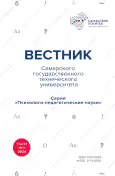Electronic course of a discipline as a structural element of the digital educational environment of a university
- 作者: Loginova L.A.1, Tkachenko E.V.1
-
隶属关系:
- South Ural State University
- 期: 卷 21, 编号 3 (2024)
- 页面: 67-80
- 栏目: Theory and methodology of education
- URL: https://journal-vniispk.ru/1991-8569/article/view/275764
- DOI: https://doi.org/10.17673/vsgtu-pps.2024.3.5
- ID: 275764
如何引用文章
全文:
详细
In recent years, digitalisation has been actively implemented in all spheres of life, and higher education is not an exception. Digital educational environment appears in universities: digital libraries, educational process support systems and distance learning (Diskurs, Flora LMS, Moodle, Docebo, Open edx, etc.), new forms of educational process construction (online courses, video lessons, etc.), various courses to improve digital literacy of university teaching staff, which contributes to the intensification of the learning process. Digitalisation contributes to the activation of independent cognitive activity of the student, provides individually oriented learning. This research deals with the use of digital technologies in teaching mathematical disciplines to students of the Federal State Autonomous Higher Education Institution «South Ural State University (National Research University)», especially for students of Architecture and Construction and Polytechnic Institutes. The use of digital technologies in teaching mathematical disciplines requires teachers’ large time expenditures for the choice of necessary elements of information educational resources and pedagogical technologies. The positive results of digitalisation of education in our study include the possibility of building individual educational trajectories for students, starting from the stage of learning new material to the stage of controlling the formation of competencies; continuous monitoring of educational results of students’ learning activities based on the rating, tracking of gaps with subsequent correction of the learning trajectory. It should be noted that in order to organise the learning process in a digital educational environment, students need to be prepared for self-dependent learning activities.
作者简介
Ludmila Loginova
South Ural State University
Email: loginovala@susu.ru
Cand. Ped. Sci., Associate Professor of Department of Mathematical and Computer
Modeling
Ekaterina Tkachenko
South Ural State University
编辑信件的主要联系方式.
Email: tkachenkoev@susu.ru
Cand. Ped. Sci., Associate Professor of Department of Computational Mechanics
俄罗斯联邦, 76, V.I. Lenin ave., Chelyabinsk, 454080参考
- Grigor’yeva I.V., Bolkunov G.A. Tsifrovaya obrazovatel’naya sreda (TsOS): vyzovy i predlozheniya [Digital educational environment (‘DEE’): implications and possibilities]. Vestnik URAO. 2023. No. 2. Pp. 64–69.
- Shmetova T.N. Klipovoye internet-soznaniye kak tip pralogicheskogo myshleniya [Clip Internet-consciousness as a type of pralogical thinking]. Vestnik Nizhegorodskogo Universiteta im. N.I. Lobachevskogo. 2013. No. 4 (2). Pp. 254–259.
- Natsional’nyy proyekt “Obrazovaniye” [National project Education]. Minprosveshcheniya Rossii. https:// edu.gov.ru›national-project/projects/cos/ (accessed April 9, 2023).
- Vaganova O.V., Gladkov A.V., Konovalova E.Y., Voronina I.R. Tsifrovyye tekhnologii v obrazovatel’nom prostranstve [Digital technologies in the educational space]. Baltiyskiy gumanitarnyy zhurnal. 2020. Vol. 9. No. 2 (31). Pp. 53–56.
- Blinov V.I., Sergeyev I.S., Esenina E.Yu. Osnovnyye idei didakticheskoy kontseptsii tsifrovogo professional’nogo obrazovaniya i obucheniya [Main ideas of the didactic concept of digital vocational education and training]. Moscow: Pero Publ., 2019. 24 p.
- Lapin V.G. Tsifrovaya obrazovatel’naya sreda kak usloviye obespecheniya kachestva podgotovki studentov v srednem professional’nom obrazovanii [Digital educational environment as a condition for ensuring the quality of student training in secondary vocational education]. Innovatsionnoye razvitiye professional’nogo obrazovaniya. 2019. No. 1 (21). Рр. 55–59.
- Shilova O.N. Tsifrovaya obrazovatel’naya sreda: pedagogicheskiy vzglyad [Digital educational environment: pedagogical view]. Sovremennyye problemy obrazovaniya i povysheniya kvalifikatsii pedagogicheskikh kadrov. 2020. No. 2 (63). Рр. 36–41.
- Bilenko P.N., Blinov V.I., Dulinov M.V. i dr. Didakticheskaya kontseptsiya tsifrovogo professional’nogo obrazovaniya i obucheniya [The didactic concept of digital vocational education and training]. Moscow: Pero Publ., 2019. 24 p.
- Uvarov A.Yu. Tsifrovaya transformatsiya i stsenarii razvitiya obshchego obrazovaniya [Digital transformation and scenarios for general education development]. Moscow: NIU VShE Publ., 2020. 108 р.
- Pratiwi W.R. The practice of digital learning (D-Learning) in the study from home (SFH) policy: teachers’ perceptions. Journal of Southwest Jiaotong University. 2020. Vol. 55. No. 4.
- Lel’chitskiy I.D., Sil’chenko A.P., Shcherbakova S.Yu. Teoreticheskiye osnovy proyektirovaniya struktury tsifrovoy obrazovatel’noy sredy [Theoretical basis for designing the structure of a digital educational environment]. Vestnik TvGU. Seriya: Pedagogika i psikhologiya. 2020. No. 3. Рр. 249–257.
- Vayndorf-Sysoyeva M.E., Subocheva M.L. «Tsifrovoye obrazovaniye» kak sistemoobrazuyushchaya kategoriya: podkhody k opredeleniyu [«Digital education» as a core sys-tem category: approaches to definition]. Vestnik MGOU. Seriya: Pedagogika. 2018. No. 3. Рр. 25–36.
- Belevitin V.A. Tsifrovizatsiya obrazovaniya: ot syanovleniya I razvitiya do tsifrovoy transformatsii [Digitalization of education: from formation and development to digital transformation: an educational and methodological guide]. Chelyabinsk: Izd-vo YuUrGGPU, 2022. 131 p.
- Noskova T.N. Didaktika cifrovoj sredy [Didactics of the digital environment]. Litres Publ., 2021.
- Rabinovich P.D. Tsifrovaya transformatsiya obrazovaniya: ot izmeneniya sredstv k razvitiyu deyatel’nosti [Digital transformation of education: from changing the means to the development of activities]. Informatika i obrazovanie. 2020. No. 5. Рр. 4–14.
- Gavrilova M.A. Informatsionno-obrazovatel’naya sreda dlya organizatsii samostoyatel’noy deyatel’nosti studentov budushchikh uchiteley matematiki [Information and educational environment for the organization of independent activity of students of future teachers of mathematics]. Izvestiya Penzenskogo gosudarstvennogo pedagogicheskogo universiteta im. V.G. Belinskogo. 2011. No. 24. Рр. 589–602.
- Mironenko E.S. Tsifrovaya obrazovatel’naya sreda: ponyatiye i struktura [Digital educational environment: concept and structure]. Sotsial’noye prostranstvo. 2019. No. 4. Рр. 6–13.
- Galimullina E.Z. Komponentnyy sostav tsifrovoy obrazovatel’noy sredy pedagoga [The component composition of the digital educational environment of the teacher]. Sovremennye problemy nauki i obrazovaniya. 2022. No. 4.
- Loginova L.A., Tkachenko E.V. Funktsii elektronnykh testov Moodle i primery ikh ispol’zovaniya na raznykh etapakh uchebnogo protsessa [Functions of electronic tests Moodle and examples of their use at different stages of the educational process]. Nauka YuUrGU. Sektsiya Estestvennykh nauk. Materialy 75-y nauchnoy konferentsii, 2023. Pр. 108–113.
- Tkachenko E.V., Loginova L.A. Osobennosti kontrolya znaniy studentov pri distantsionnoy forme organizatsii uchebnogo protsessa [Peculiarities of students’ knowledge control at the distance form of educational process organization]. Nauka YuUrGU. Sektsiya Estestvennykh nauk. Materialy 74-y nauchnoy konferentsii, 2022. Pр. 77–80.
补充文件







